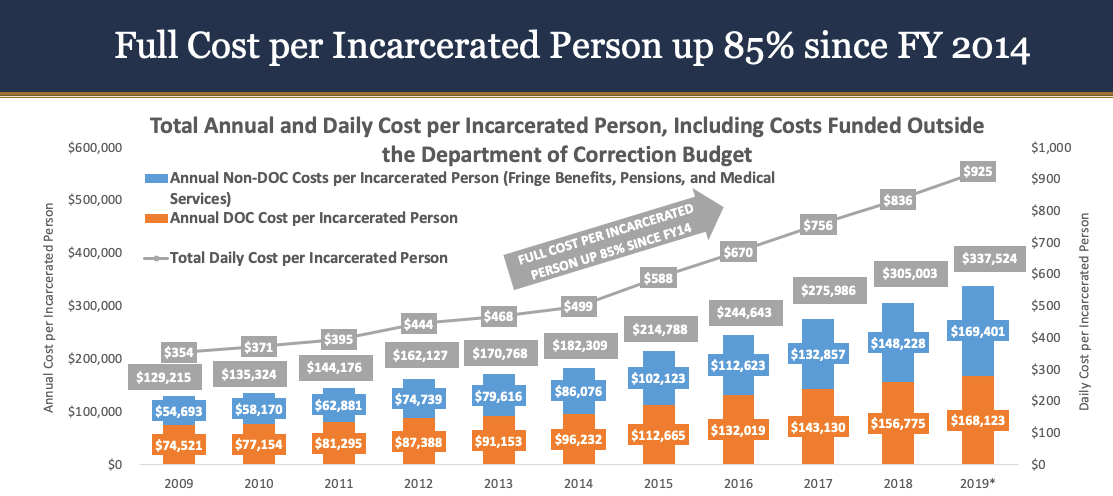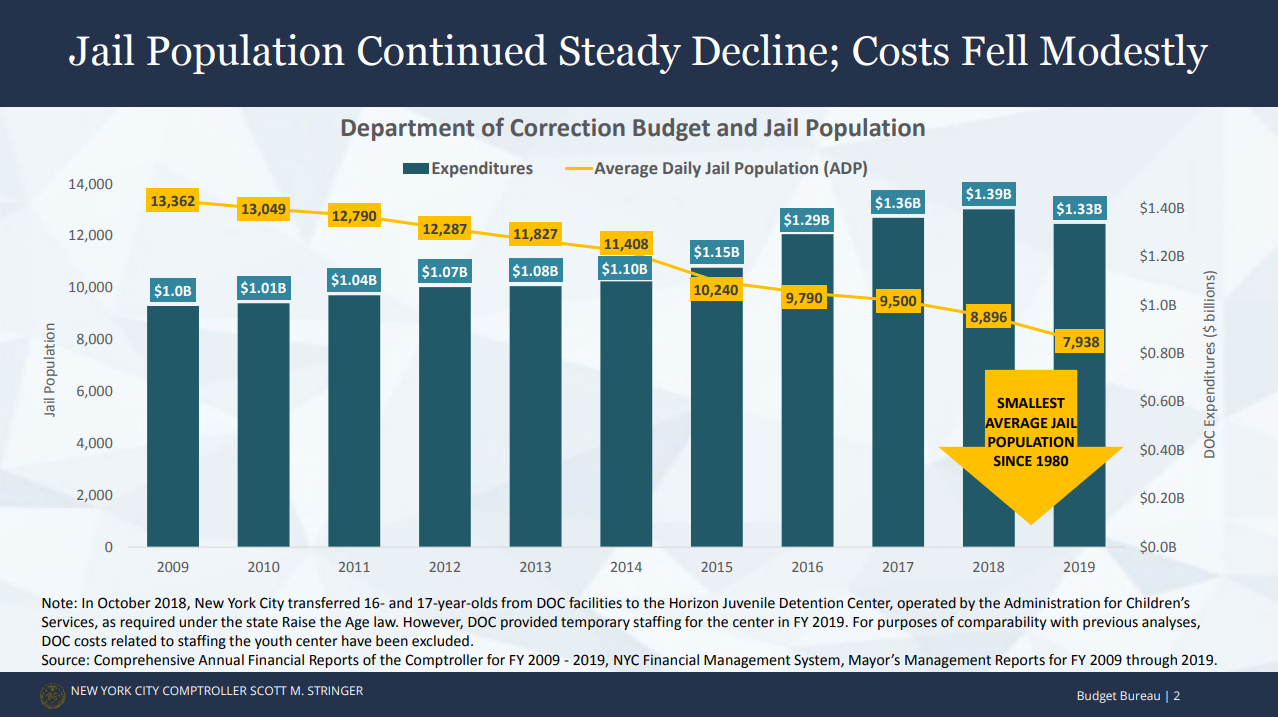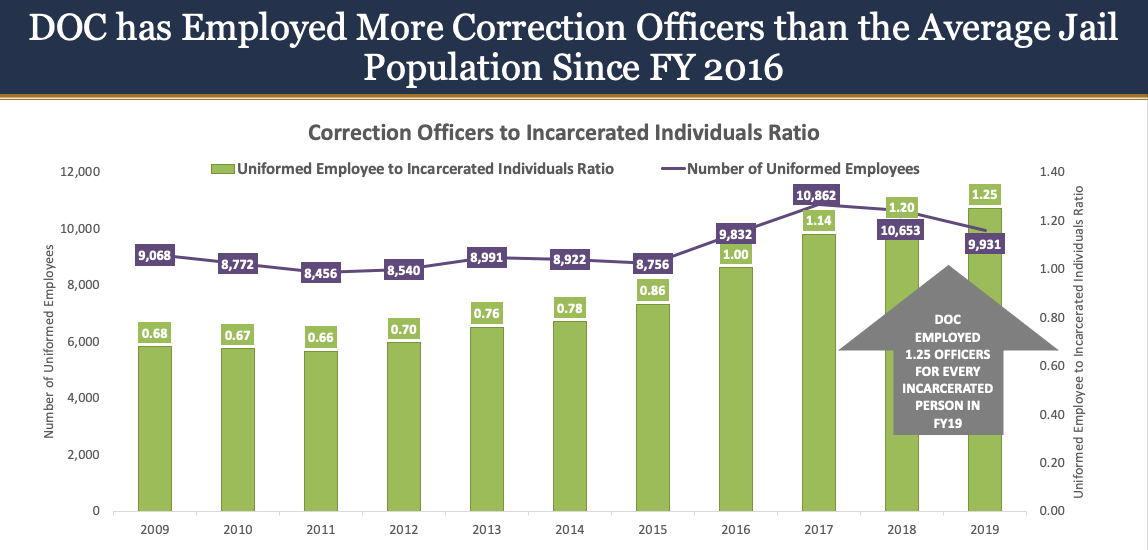Comptroller Stringer: Cost of Incarceration per Person in New York City Skyrockets to All-Time High

Annual cost of incarceration grows to $337,524 a person per year – or $925 each day
DOC budget declined by 4 percent but costs outside DOC’s budget continue to grow
Average daily jail population fell by 41 percent over past decade – but violent infractions increased by 79 percent
(New York, NY)—The cost of incarceration per person in New York City ballooned to an all-time high in FY 2019, according to a new analysis of the Department of Correction released today by New York City Comptroller Scott M. Stringer. The City now spends $337,524 to incarcerate one person for a full year, or $925 per day – an 85 percent increase since 2014. At the same time, while the Department of Correction’s budget declined for the first time in recent history, additional jail-related expenses continue to grow. And, continuing a disturbing trend identified in previous analyses by the Comptroller’s Office, violent incidents continue to rise disproportionately to the declining incarcerated population. As the City moves to construct four new jail facilities in the Bronx, Brooklyn, Manhattan and Queens and implement sweeping changes to bail, discovery and speedy trial laws, these findings underscore the continued financial and personal costs of the current system.
“It’s time to fundamentally transform our criminal justice system – and key to that, is an efficient, thoughtful, and modern corrections system. Although our jail system has shrunk, this analysis shows that the system has not changed, as spending, violence, and the use of force continue to rise disproportionately. For long-term savings—and the long-term good of our City—we must start seeing better all-around outcomes as our jail population declines,” said New York City Comptroller Scott M. Stringer. “Our vastly reduced jail population should be yielding significant savings that we can reinvest in communities and strategies that keep our jail population as small as possible and turn the page from decades of mass incarceration. We have far more work to do.”
This analysis is the Comptroller’s 6th annual update of spending and performance trends of the New York City Department of Correction (DOC). The analysis uses budget data, claims against the City, reports of violence in City jails, and personnel data to analyze the DOC’s operations.
The Comptroller’s Office has also included the DOC on its Agency Watch List for fiscal years 2019 and 2020.
According to the analysis:
The full annual cost of incarceration grew to $337,524 per person in FY 2019
- Including all costs related to the City’s jail facilities, the City spends $337,524 to incarcerate one person for a full year, the equivalent of $925 per person per day.
- Since FY 2014, the full cost of incarceration has increased by 85 percent.

DOC’s budget declined in FY 2019
- The DOC’s budget declined for the first time in recent history, falling $60 million to about $1.3 billion in FY 2019, a contraction of about 4 percent
- The budget contraction followed the closure of the George Motchan Detention Center in June 2018 and the removal of all 16- and 17-year olds to the Horizon Juvenile Detention Center in October 2018, as required under the state Raise the Age law.
- While the Horizon Center is operated by the Administration for Children’s Services, the DOC provided temporary staffing for the center in FY 2019. For purposes of comparability with previous analyses, DOC costs related to staffing the youth center have been excluded.

Additional costs outside the DOC’s budget continue to grow
- In FY 2019, the City funded an additional $1.3 billion in jail-related expenses outside the DOC budget, including employee fringe benefits and pension contributions and correctional health care services.
- Jail-related expenses outside the DOC budget are estimated to have grown by about 2 percent in FY 2019.
Steep decline in the number of incarcerated persons
- The average daily jail population fell by 11 percent from 8,896 in FY 2018 to 7,938 in FY 2019. Over the last 10 years, the average population has contracted by 41 percent.
- Further reductions in the jail population are expected when State-adopted reforms to bail, discovery, and speedy trial laws take effect on January 1, 2020.
The ratio of correction officers to incarcerated persons continued to rise
- At the end of FY 2019, the DOC employed 9,931 correction officers, excluding 258 officers assigned to the Horizon Juvenile Detention Center.
- The number of officers has exceeded the average daily population since FY 2016 and reached a ratio of 1.25 officers for every incarcerated person in FY 2019.
- DOC overtime spending fell for the third consecutive year in FY 2019 to $177 million after reaching a high of $275 million in FY 2016.

Violent incidents keep rising disproportionately
- In FY 2019, the rate of fight and assault infractions per incarcerated person rose by 12 percent, while the rate of assaults on staff rose by 37 percent and the rate of use of force rose by 42 percent.
- As the average daily jail population fell by 41 percent over the past decade, the raw number of fight and assault infractions in jail went up by 79 percent and the raw number of incidents and allegations of correction officer use of force on incarcerated individuals more than tripled.
- The number of tort claims filed for personal injury at a correctional facility has nearly quadrupled from 1,061 in FY 2008 to 3,894 in FY 2018.
- While the incarcerated population has decreased, the share of the population with a disproportionate propensity to violence has increased. From FY 2014 to FY 2019, the share of the jail population designated as a “security risk” increased from 8.2 percent to 16.4 percent, as the share of the population with a mental health diagnosis grew from 38 percent to 45 percent.
To see Comptroller Stringer’s full report, click here.
###